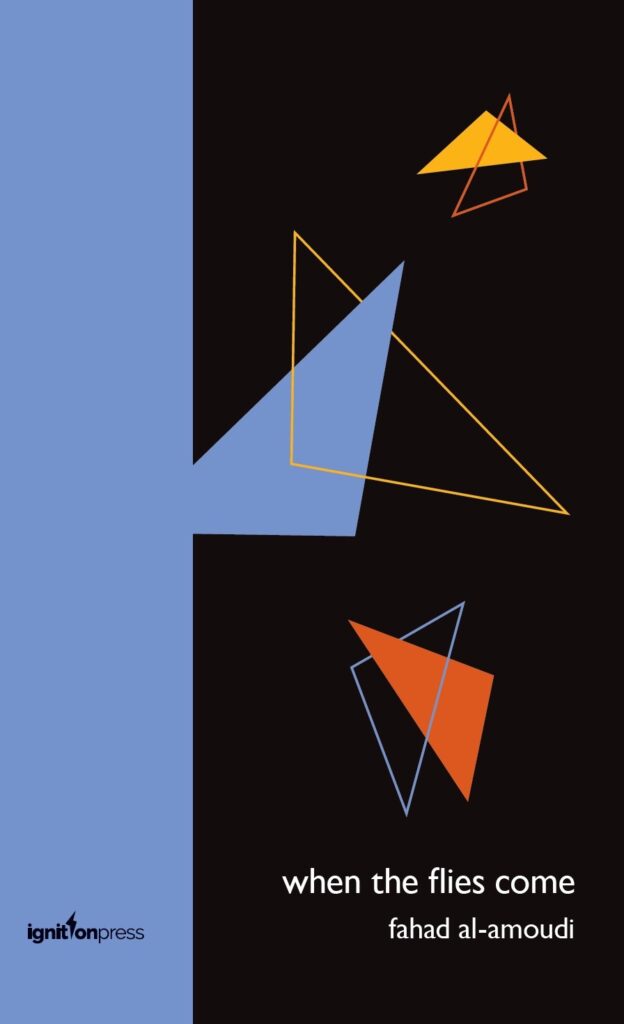
I’m an avid reader of pamphlets and the wealth of skill they exhibit; as poetry becomes more popular and well-regarded, more and more emerging poets are publishing several pamphlets before deciding on a full-length collection. A pamphlet is like an EP; it can come before an album, or be regarded as its own space and form, and provides the artist room for concision, experiments, saying exactly what they wish to say, no more, no less.
***
Fahad Al-Amoudi’s when the flies come is a debut pamphlet published by ignitionpress and shortlisted for the 2023 Michael Marks Award and a Winter 2023 Poetry Book Society Pamphlet Choice. Fahad and I are both members of The Writing Squad and I have followed Fahad’s career since his prizewinning entry to the White Review Poets Prize. He was previously an Editing Intern for Ink Sweat & Tears and published my poem, ‘On Being Ghosted by a Famous Musician’.
when the flies come exists in a state of play. I love it when poets work with or against the narrative ‘I’ and situate varieties of logic, space, and time within one pamphlet or collection.
In when the flies come, Fahad Al-Amoudi plays with space and focalisation in ‘Cicada’:
Clouds rub against each other like cicadas. You can even see where they meet and run your finger along the edge of their precipice. The light is dull. It falls through the gap as syrup.
The poem acts as the opening to when the flies come, a textured and surreal, long-lined exploration of sound. ‘Cicada’ plays with world setting and opts for soft subverting; pulling reference, sound and colour together to form a unique, tectonic series of words and images.
Fahad Al-Amoudi’s positioning of events, sounds, and scenery is again seen in ‘The Night You Saw Marvin’, placing the reader in close proximity to the speaker, playing with authorial voice, and creating a chasm with such deftness I’m reminded of short story writers like Alice Munro and Lesley Nneka Arimah, who effortlessly blend the surreal with chance encounters:
Up there, the spotlight dilates,
yawns in the heat of an adolescent night,
where a homeless man looks at a twopence
through one eye, it’s shadow enveloping
a fossil of moon. Can you believe it?
A man enters a place like this,
seats still chattering. He is a spectral presence,
brings with him the metallurgy of night –
the splash of drums, the circle
of horns catching fire in sequence.
Marvin Gaye entering a space unexpected of him, the blending of two voices and styles of narration, reminds me of when the flies come as a whole. There are several distinct speakers, with the initial ‘Note on the Text’, in my opinion, acting as a red herring. Of course there are elements from Alemayehu explicitly included (the unsorted and unsent extracts with italicised titles), but the ‘Note’ acts as a subversion of itself. What does the reader expect when given the historical context of 1868? Do they expect horses and carriages, workhouses, hot summer air? Or are we caught by our own surmising, our own conceptions of a time and place, our own linearity? The direction in the above quote, is a soft reference: can you believe it? and do you?
when the flies come is a one-of-a-kind pamphlet, with echoing defamiliarisation, poems linked by their causality, and meditations on music, change, and belief. The pamphlet poses questions within their lines, opting to leave the answers unsaid, or unsent, or unwritten, the speakers working in tandem, but not quite a chorus.
Fahad Al-Amoudi’s pamphlet is available to buy from the Oxford Brookes Poetry online shop for £6.00.
